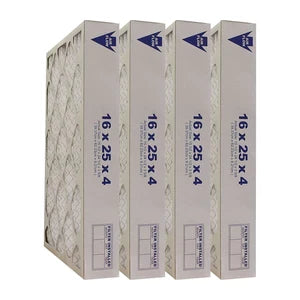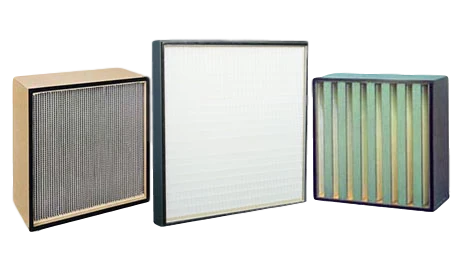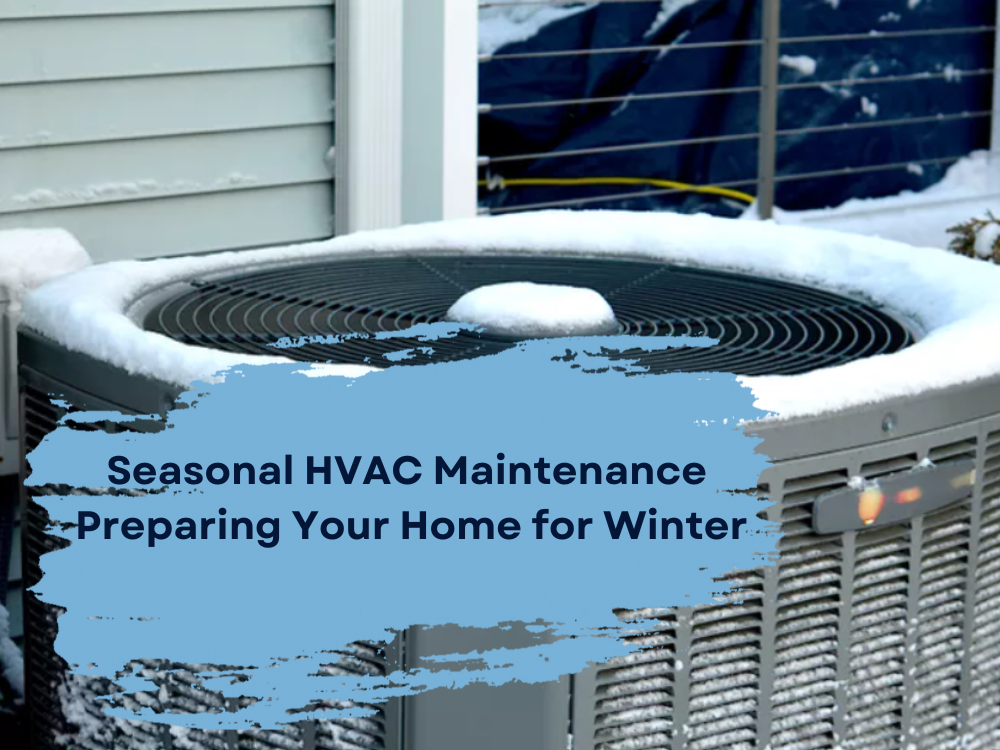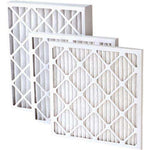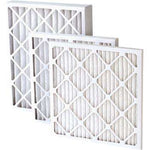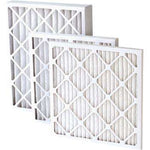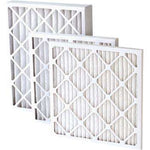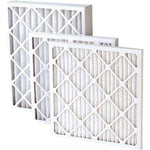Vous avez pas d'articles dans votre panier.
As winter approaches, ensuring your home remains warm and comfortable becomes a top priority. Seasonal HVAC maintenance is crucial not only for comfort but also for efficiency and safety. In this blog post, we'll explore the essential steps for preparing your HVAC system for the cold months ahead, helping you avoid unexpected breakdowns and ensuring your system operates at peak efficiency.

Why Seasonal HVAC Maintenance is Important
Your HVAC system works hard during the winter to keep your home warm. Without proper maintenance, your system can degrade faster, leading to inefficient operation and increased energy costs. Regular maintenance can help:
- Extend the lifespan of your HVAC system
- Reduce the likelihood of costly breakdowns
- Improve energy efficiency, lowering your heating bills
- Enhance indoor air quality
Key Steps for Winter Preparation
-
Replace or Clean Air Filters: Dirty air filters restrict airflow, forcing your system to work harder, which can lead to increased energy costs and system strain. Check and replace your filters every 30-90 days, depending on usage and filter type.
-
Inspect Heating Components: Have a professional HVAC technician inspect your furnace or heat pump to ensure all components are in good working order. This includes checking the ignition burner assembly, heat exchanger, and blower motor.
-
Test Thermostat Settings: Ensure your thermostat is working correctly and consider upgrading to a smart thermostat if you haven’t already. Smart thermostats can improve energy efficiency by adjusting the temperature based on your schedule and preferences.
-
Seal Leaks in Ductwork: Leaky ducts can significantly reduce heating efficiency. Have your ductwork inspected and sealed or insulated as necessary to prevent heat loss.
-
Clear Vents and Registers: Make sure all vents and registers are clear of furniture, carpets, and curtains to ensure free air flow.
-
Schedule Professional Maintenance: A professional HVAC service can include additional checks such as testing electrical connections and measuring voltage and current on motors. Professional servicing ensures your system operates efficiently and safely throughout the winter.
Choosing the Right Air Filter for Winter
During winter, the type of air filter you use in your HVAC system plays a pivotal role in its efficiency and the air quality of your home. Here are some options:
-
Pleated Filters: These are made from polyester or cotton folds and can trap small particles such as dust mites, pet dander, and even bacteria, making them ideal for winter when homes are typically closed up and air circulation is reduced.
-
HEPA Filters: High-Efficiency Particulate Air (HEPA) filters capture up to 99.97% of airborne particles, including pollen, dust, and smoke. They are particularly beneficial for households with allergy sufferers.
-
Electrostatic Filters: These use self-charging fibers to attract particles. They are washable and reusable, which makes them a cost-effective option. They're great for capturing smaller particles and can be beneficial during the winter months when indoor air quality can decline.
-
Activated Carbon Filters: While not necessarily for trapping particles, these filters are excellent at removing odors and VOCs (Volatile Organic Compounds), which can be useful if your home is sealed tight during cold weather and has limited fresh air intake.
FAQs about Seasonal HVAC Maintenance
Q: How often should HVAC maintenance be done?
A: Ideally, HVAC systems should be checked at least twice a year, in the fall before the heating season and in the spring before the cooling season.
Q: Can I perform HVAC maintenance myself?
A: Some tasks, like changing air filters or clearing vents, can be done by homeowners. However, it's recommended to have professional maintenance done annually to handle more complex checks and repairs.
Q: What are the signs that my HVAC system needs maintenance?
A: Signs include unusual noises, poor heating performance, frequent cycling, and higher than usual energy bills.
Q: How long does an HVAC system last?
A: With proper maintenance, HVAC systems can last 15-20 years. However, the lifespan can vary based on the model, usage, and how well the system is maintained.
Q: What is the best temperature to set my thermostat in winter?
A: The optimal temperature for comfort and efficiency is typically around 68°F (20°C) when you are home. Lowering the thermostat by 7-10 degrees while you sleep or are away can save on heating costs.
Preparing your HVAC system for winter is a proactive measure that can save you money, enhance your comfort, and extend the life of your system. By following these maintenance steps and considering professional assistance, you can ensure a warm and efficient home during the colder months.
As winter approaches, ensuring your home remains warm and comfortable becomes a top priority. Seasonal HVAC maintenance is crucial not only for comfort but also for efficiency and safety. In this blog post, we'll explore the essential steps for preparing your HVAC system for the cold months ahead, helping you avoid unexpected breakdowns and ensuring your system operates at peak efficiency.

Why Seasonal HVAC Maintenance is Important
Your HVAC system works hard during the winter to keep your home warm. Without proper maintenance, your system can degrade faster, leading to inefficient operation and increased energy costs. Regular maintenance can help:
- Extend the lifespan of your HVAC system
- Reduce the likelihood of costly breakdowns
- Improve energy efficiency, lowering your heating bills
- Enhance indoor air quality
Key Steps for Winter Preparation
-
Replace or Clean Air Filters: Dirty air filters restrict airflow, forcing your system to work harder, which can lead to increased energy costs and system strain. Check and replace your filters every 30-90 days, depending on usage and filter type.
-
Inspect Heating Components: Have a professional HVAC technician inspect your furnace or heat pump to ensure all components are in good working order. This includes checking the ignition burner assembly, heat exchanger, and blower motor.
-
Test Thermostat Settings: Ensure your thermostat is working correctly and consider upgrading to a smart thermostat if you haven’t already. Smart thermostats can improve energy efficiency by adjusting the temperature based on your schedule and preferences.
-
Seal Leaks in Ductwork: Leaky ducts can significantly reduce heating efficiency. Have your ductwork inspected and sealed or insulated as necessary to prevent heat loss.
-
Clear Vents and Registers: Make sure all vents and registers are clear of furniture, carpets, and curtains to ensure free air flow.
-
Schedule Professional Maintenance: A professional HVAC service can include additional checks such as testing electrical connections and measuring voltage and current on motors. Professional servicing ensures your system operates efficiently and safely throughout the winter.
Choosing the Right Air Filter for Winter
During winter, the type of air filter you use in your HVAC system plays a pivotal role in its efficiency and the air quality of your home. Here are some options:
-
Pleated Filters: These are made from polyester or cotton folds and can trap small particles such as dust mites, pet dander, and even bacteria, making them ideal for winter when homes are typically closed up and air circulation is reduced.
-
HEPA Filters: High-Efficiency Particulate Air (HEPA) filters capture up to 99.97% of airborne particles, including pollen, dust, and smoke. They are particularly beneficial for households with allergy sufferers.
-
Electrostatic Filters: These use self-charging fibers to attract particles. They are washable and reusable, which makes them a cost-effective option. They're great for capturing smaller particles and can be beneficial during the winter months when indoor air quality can decline.
-
Activated Carbon Filters: While not necessarily for trapping particles, these filters are excellent at removing odors and VOCs (Volatile Organic Compounds), which can be useful if your home is sealed tight during cold weather and has limited fresh air intake.
FAQs about Seasonal HVAC Maintenance
Q: How often should HVAC maintenance be done?
A: Ideally, HVAC systems should be checked at least twice a year, in the fall before the heating season and in the spring before the cooling season.
Q: Can I perform HVAC maintenance myself?
A: Some tasks, like changing air filters or clearing vents, can be done by homeowners. However, it's recommended to have professional maintenance done annually to handle more complex checks and repairs.
Q: What are the signs that my HVAC system needs maintenance?
A: Signs include unusual noises, poor heating performance, frequent cycling, and higher than usual energy bills.
Q: How long does an HVAC system last?
A: With proper maintenance, HVAC systems can last 15-20 years. However, the lifespan can vary based on the model, usage, and how well the system is maintained.
Q: What is the best temperature to set my thermostat in winter?
A: The optimal temperature for comfort and efficiency is typically around 68°F (20°C) when you are home. Lowering the thermostat by 7-10 degrees while you sleep or are away can save on heating costs.
Preparing your HVAC system for winter is a proactive measure that can save you money, enhance your comfort, and extend the life of your system. By following these maintenance steps and considering professional assistance, you can ensure a warm and efficient home during the colder months.
